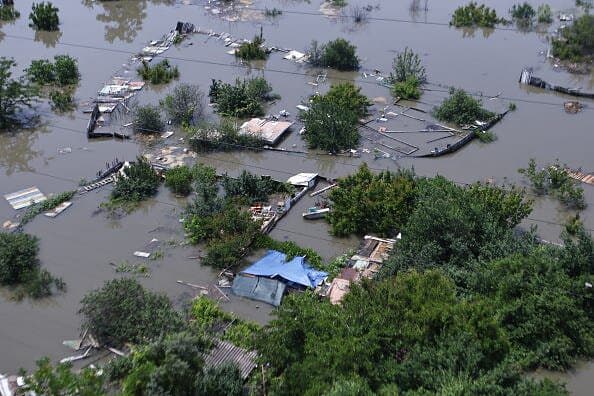The Nova Kakhovka Dam in Ukraine
The Nova Kakhovka Dam in Ukraine, controlled by Russia, has been destroyed. One consequence is a humanitarian disaster that, had it not taken place within a war zone, would already have drawn enormous international assistance. Thousands of houses are flooded and tens of thousands of people are in flight or waiting for rescue. Another consequence is ecological mayhem, among other things the loss of wetland and other habitats. A third is the destruction of Ukrainian farmland and other elements of the Ukrainian economy. So much is happening at once that the story is hard to follow. Here are a few thoughts about writing responsibly about the event.
- Avoid the temptation to begin the story of this manmade humanitarian and ecological catastrophe by bothsidesing it. That's not journalism.
- Russian spokespersons claiming that Ukraine did something (in this case, blow a dam) is not part of a story of an actual event in the real world. It is part of different story: one about all the outrageous claims Russia has made about Ukraine since the first invasion, in 2014. If Russian claims about Ukrainian actions are to be mentioned, it has to be in that context.
- Citing Russian claims next to Ukrainian claims is unfair to the Ukrainians. In this war, what Russian spokespersons have said has almost always been untrue, whereas what Ukrainian spokespersons have said has largely been reliable. The juxtaposition suggests an equality that makes it impossible for the reader to understand that important difference.
- If a Russian spokesman (e.g. Dmitri Peskov) must be cited, it must be mentioned that this specific figure has lied about every aspect of this war since it began. This is context. Readers picking up the story in the middle need to know such background.
- If Russian propaganda for external consumption is cited, it can help to also cite Russian propaganda for internal consumption. It is interesting that Russian propagandists have been long arguing that Ukrainian dams should be blown, and that a Russian parliamentarian takes for granted that Russia blew the dam and rejoices in the death and destruction that followed.
- When a story begins with bothsidesing, readers are being implicitly instructed that an object in the physical world (like a dam) is really just an element of narrative. They are being guided into the wrong genre (literature) right at the moment when analysis is needed. This does their minds a disservice.
- Dams are physical objects. Whether or how they can be destroyed is a subject for people who know what they are talking about. Although this valuable NYT story exhibits the above flaws, it has the great merit of treating dams as physical rather than narrative objects. When this exercise is performed, it seems clear that the dam could only have been destroyed by an explosion from the inside.
- Russia was in control of the relevant part of the dam when it exploded. This is an elemental part of the context. It comes before what anyone says. When a murder is investigated, detectives think about means. Russia had the means. Ukraine did not.
- The story doesn't start at the moment the dam explodes. Readers need to know that for the last fifteen months Russia has been killing Ukrainian civilians and destroying Ukrainian civilian infrastructure, whereas Ukraine has been trying to protect its people and the structures that keep them alive.
- The setting also includes history. Military history offers an elemental point. Armies that are attacking do not blow dams to block their own path of advance. Armies that are retreating do blow dams to slow the advance of the other side. At the relevant moment, Ukraine was advancing, and Russia was retreating.

The pursuit of objectivity does not mean treating every event as a coin flip, a fifty-fifty chance between two different public statements. Objectivity demands thinking about all the objects -- physical objects, physical placement of people -- that must be in the story, as well as all of the settings -- contemporary and historical -- that a reader would need in order to come away from the story with greater understanding.






